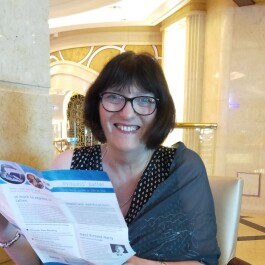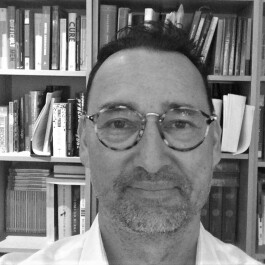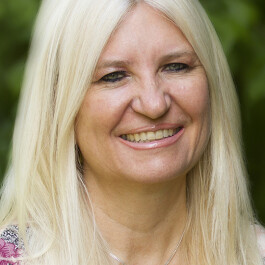- You can search by name, location, type of practitioner and type of consultation provided.
- Further refine your results by searching against gender, and languages spoken.
- Search for health professionals in rural and remote areas
- You can choose different mental health professionals including psychologists, psychiatrists, general practitioners, accredited mental health social workers, mental health nurses, occupational therapists, counsellors, and Aboriginal and Torres Strait Islander workers, all of who say a little about how they work with clients.

Mrs Elizabeth Chapman
Social Worker
Now working in private practice as a mental health social worker in the Mornington Peninsula area of Melbourne. Expertise in Bereavement Counselling, specifically Traumatic Bereavement. Specific training in the area of Loss and Grief. 18 years experience as a qualified counsellor working in a range of settings, Community Health, working with survivors of sexual, and emotional , and physical, abuse. Mental health is usually with clients experiencing depression and anxiety.History of working in Palliative Care, Family services, support after suicide services, migrant services, and Asylum seekers. education and support to carers After completing training in critical incident debriefing and support, presently also works with groups and individuals, who have experienced a stressful situation at work, or a death on site.
After hours appointment may be available, please contact me for details.
View Profile
After hours appointment may be available, please contact me for details.

Ms Francesca Palazzolo
Counsellor
I am a trauma informed counsellor and psychotherapist working in the humanistic tradition. That means I use a person centred approach. I work with all sorts of issues including mental health, addictive behaviours, trauma and relationship concerns.
I am registered with PACFA (Psychotherapy and Counselling Federation Australia) which is the national peak body for counsellors and psychotherapists in Australia.
I have experience in youth mental health, addiction counselling and alcohol and other drugs counselling. In my private practice, I am particularly interested in helping those who have problems with behavioural addictions, particularly internet pornography addiction and those with a history of trauma. According to the ACE’s (Adverse Childhood Experiences) study, people who have 4 or more (out of 10) Adverse Childhood Experiences are more likely to develop substance use disorders or other addictions, mental health and physical health issues than those that did not.
I also work from a trauma informed, holistic viewpoint and am a firm believer in the mind-body connection, in the importance of social connection, diet, exercise and spirituality in affecting meaningful change. All things work together, as they say, and this is true for mental health, physical health and general well-being.
I have worked as a counsellor since 2015, when I graduated with a Graduate Diploma in Counselling from ACAP (Australian College of Applied Psychology). My lived experience as a survivor of family violence initially led me to want to work as a helping professional. My experience as an AOD (Alcohol & Other Drugs) counsellor has shown me that trauma happens at all stages of life and has ripple effects that can last a life-time. However, I also believe that we all contain the ability to heal ourselves and achieve authenticity, grace and wholeness regardless of what happened to us.
View Profile
I am registered with PACFA (Psychotherapy and Counselling Federation Australia) which is the national peak body for counsellors and psychotherapists in Australia.
I have experience in youth mental health, addiction counselling and alcohol and other drugs counselling. In my private practice, I am particularly interested in helping those who have problems with behavioural addictions, particularly internet pornography addiction and those with a history of trauma. According to the ACE’s (Adverse Childhood Experiences) study, people who have 4 or more (out of 10) Adverse Childhood Experiences are more likely to develop substance use disorders or other addictions, mental health and physical health issues than those that did not.
I also work from a trauma informed, holistic viewpoint and am a firm believer in the mind-body connection, in the importance of social connection, diet, exercise and spirituality in affecting meaningful change. All things work together, as they say, and this is true for mental health, physical health and general well-being.
I have worked as a counsellor since 2015, when I graduated with a Graduate Diploma in Counselling from ACAP (Australian College of Applied Psychology). My lived experience as a survivor of family violence initially led me to want to work as a helping professional. My experience as an AOD (Alcohol & Other Drugs) counsellor has shown me that trauma happens at all stages of life and has ripple effects that can last a life-time. However, I also believe that we all contain the ability to heal ourselves and achieve authenticity, grace and wholeness regardless of what happened to us.

Dr Henry Luiker
Psychologist
Hello reader of my bio.
My professional background appears here https://www.parksclinic.com/who/dr-henry-g-luiker/
I describe the treatment modality I offer, Intensive Short Term Dynamic Psychotherapy, here https://www.parksclinic.com/what/counselling-psychotherapy/
Can I describe here in about 500 words the process through which I help survivors of severe abuse at the hands of previously trusted individuals (that is, people to whom we are emotionally attached in some way)? I will give it a go.
The first step is: we identify together, what are your current problems? What symptoms, problems, anxieties, relationship difficulties, work or study difficulties, limits on fulfilling your potential, do you want to solve?
The second step is: your learning how you connect with yourself bodily and viscerally as we have this discussion. For example: am I feeling tense or anxious? How do I experience this anxiety? Do I feel overwhelmed and want to rush out of the room ? Does my head go fuzzy? Do I start to become distrustful and fearful of the therapist? Am I nauseous? Do I start to confuse in my mind the therapist with the abuser? Do I go numb? Do I detach and mentally leave the room? When we experience severe abuse of our bodies and emotions, we can be left with a ""distorted"" and problematic connection with our own bodies and emotions.
By the time we get through these two steps, we will have clear ideas of what you want to achieve in our work, and have established your role as the ""compass"" for our work - you will monitor your anxiety so that we are in a productive place, neither insufficiently challenged nor too uncomfortable. We want to find your productive ""middle"" and try to stay there. If anxiety is too high all the time, I will help you learn to manage your anxiety before we proceed on your climb up your personal Mount Everest.
By this time you will (hopefully!) have a sense of whether you think I am competent and likely to be able to help you. If you don't, we will discuss finding a therapist, perhaps with a different approach, that might be more helpful to you.
Intensive Short Term Dynamic Psychotherapy is a powerful and effective treatment, with very strong scientific evidence (for further reading see Prof Allan Abbass's webpage http://reachingthroughresistance.com/intensive-short-term-dynamic-psychotherapy/).
But its not for everyone. And it is part of the ISTDP method that we will together establish that in the first few sessions, so that you don't waste your precious time and your precious opportunity to get help, engaged in a therapy that is not helping you.
View Profile
My professional background appears here https://www.parksclinic.com/who/dr-henry-g-luiker/
I describe the treatment modality I offer, Intensive Short Term Dynamic Psychotherapy, here https://www.parksclinic.com/what/counselling-psychotherapy/
Can I describe here in about 500 words the process through which I help survivors of severe abuse at the hands of previously trusted individuals (that is, people to whom we are emotionally attached in some way)? I will give it a go.
The first step is: we identify together, what are your current problems? What symptoms, problems, anxieties, relationship difficulties, work or study difficulties, limits on fulfilling your potential, do you want to solve?
The second step is: your learning how you connect with yourself bodily and viscerally as we have this discussion. For example: am I feeling tense or anxious? How do I experience this anxiety? Do I feel overwhelmed and want to rush out of the room ? Does my head go fuzzy? Do I start to become distrustful and fearful of the therapist? Am I nauseous? Do I start to confuse in my mind the therapist with the abuser? Do I go numb? Do I detach and mentally leave the room? When we experience severe abuse of our bodies and emotions, we can be left with a ""distorted"" and problematic connection with our own bodies and emotions.
By the time we get through these two steps, we will have clear ideas of what you want to achieve in our work, and have established your role as the ""compass"" for our work - you will monitor your anxiety so that we are in a productive place, neither insufficiently challenged nor too uncomfortable. We want to find your productive ""middle"" and try to stay there. If anxiety is too high all the time, I will help you learn to manage your anxiety before we proceed on your climb up your personal Mount Everest.
By this time you will (hopefully!) have a sense of whether you think I am competent and likely to be able to help you. If you don't, we will discuss finding a therapist, perhaps with a different approach, that might be more helpful to you.
Intensive Short Term Dynamic Psychotherapy is a powerful and effective treatment, with very strong scientific evidence (for further reading see Prof Allan Abbass's webpage http://reachingthroughresistance.com/intensive-short-term-dynamic-psychotherapy/).
But its not for everyone. And it is part of the ISTDP method that we will together establish that in the first few sessions, so that you don't waste your precious time and your precious opportunity to get help, engaged in a therapy that is not helping you.


Ms Jane Tiggeman
Psychologist
Jane is a registered psychologist with over 30 years experience in psychotherapy/counselling. She is a member of the Australian Psychological Society.
For the last 30 years Jane has worked in private practise and has also worked part-time in schools and has been a consultant to various workplaces.
Early in her career Jane became involved in assisting clients to recover from various forms of abuse (emotional, physical) and in particular child sexual abuse. She has had extensive experience assisting clients who have been sexually abused by clergy, teachers, caregivers and by others in positions of power over children.She works with both men and women across the lifespan from young adults to older adults.
Jane considers it a privilege to assist people in their journey of recovery from the effects of child sexual abuse to become as much as possible the person they would have been had abuse not entered their lives.
She utilises a strengths based approach which draws on solution focussed and narrative therapy methodology. In therapy, qualities of character and resource are identified as to how the survivor has risen above the adversity of the abuse, to enable their story of survival.
Jane is passionate about her work and offers empathy, unconditional positive regard, genuineness and respect to her clients. She is focussed on developing a high quality therapeutic relationship with the client. She recognises that survivors coming into therapy usually are facing feelings of fear, shame, guilt and general discomfort when they are deciding to tell their story. She knows disclosing toxic secrets that perpetrators have tricked them into bearing the burden of is often initially a difficult step to take.
Jane works with people to be able to share their story to the level of detail they wish to share, in a context of safety and trust. She is aware that trust needs to be earned and established within the therapeutic relationship and that some survivors need considerable time to build up that trust in the therapist.
Jane is aware that survivors need to feel safe and build trust in order to regain a sense of empowerment in their lives.
Jane works with people that may have a variety of issues such as Post Traumatic Stress Disorder (PTSD), anxiety and depression issues, anger management issues, problems with assertiveness and self-confidence, drug and alcohol issues, and relationship problems. Jane for many years has provided assessments and reports for trauma survivors for victims of crime, compensation or various medico-legal matters.
View Profile
For the last 30 years Jane has worked in private practise and has also worked part-time in schools and has been a consultant to various workplaces.
Early in her career Jane became involved in assisting clients to recover from various forms of abuse (emotional, physical) and in particular child sexual abuse. She has had extensive experience assisting clients who have been sexually abused by clergy, teachers, caregivers and by others in positions of power over children.She works with both men and women across the lifespan from young adults to older adults.
Jane considers it a privilege to assist people in their journey of recovery from the effects of child sexual abuse to become as much as possible the person they would have been had abuse not entered their lives.
She utilises a strengths based approach which draws on solution focussed and narrative therapy methodology. In therapy, qualities of character and resource are identified as to how the survivor has risen above the adversity of the abuse, to enable their story of survival.
Jane is passionate about her work and offers empathy, unconditional positive regard, genuineness and respect to her clients. She is focussed on developing a high quality therapeutic relationship with the client. She recognises that survivors coming into therapy usually are facing feelings of fear, shame, guilt and general discomfort when they are deciding to tell their story. She knows disclosing toxic secrets that perpetrators have tricked them into bearing the burden of is often initially a difficult step to take.
Jane works with people to be able to share their story to the level of detail they wish to share, in a context of safety and trust. She is aware that trust needs to be earned and established within the therapeutic relationship and that some survivors need considerable time to build up that trust in the therapist.
Jane is aware that survivors need to feel safe and build trust in order to regain a sense of empowerment in their lives.
Jane works with people that may have a variety of issues such as Post Traumatic Stress Disorder (PTSD), anxiety and depression issues, anger management issues, problems with assertiveness and self-confidence, drug and alcohol issues, and relationship problems. Jane for many years has provided assessments and reports for trauma survivors for victims of crime, compensation or various medico-legal matters.

Mrs Janice Marshall
Counsellor
Jani is highly experienced in the field of trauma, suicidality, critical incidents and grief and loss for over 20 years. Jani has a Masters of Suicidology, Post Grad Dip of Counselling and is fully trained in Cognitive Processing Therapy for PTSD.
View Profile

Mrs Jay Anderson
Counsellor
Mrs Jay Anderson is registered as a Counsellor and a Psychologist. She has worked with people for over 20 years, the last 10 years in therapy/counselling. She has specific training in a range of areas including trauma and childhood abuse with both adults and children. Jay and the team at the SW Wellbeing Centre are client-centred practitioners who aim to help ""make a difference"" in your life.
View Profile

Mrs Jay Ellul
Counsellor
Jay Ellul is an insightful and empathetic counsellor with over 20 years of counselling experience. She is an accredited counsellor and clinical supervisor with the Australian Counselling Association. Jay has run a successful private practice for over 5 years, with many client testimonies supporting the effectiveness of her approach. Jay has also gained a wealth of experience from working in a variety of organisations in the domestic violence sector, in the mediation space, with clients experiencing unplanned pregnancies, with children and adults who have experienced sexual assault and in working with clients and families with a complex trauma background.
Jay has experience of working with a diverse range of clients including children, young people, individuals, families and couples and is strongly committed to helping her clients to create the change they desire within themselves and their relationships.
Jay works from a strengths-based, trauma informed, solution-focused framework with a lens sharply focused on helping clients to achieve their very best through gentle, collaborative exploration. Jay will provide feedback and psycho-education when appropriate in order that clients leave counselling equipped with practical, personalised strategies to help overcome life’s challenges. She is passionate about alleviating her client’s struggles and restoring hope by boosting confidence and building resilience.
Jay uses a range of modalities to support her clients including EMDR, Trauma-focused Therapy, Narrative and Solution-Focused Therapy and Sand Tray work.
View Profile
Jay has experience of working with a diverse range of clients including children, young people, individuals, families and couples and is strongly committed to helping her clients to create the change they desire within themselves and their relationships.
Jay works from a strengths-based, trauma informed, solution-focused framework with a lens sharply focused on helping clients to achieve their very best through gentle, collaborative exploration. Jay will provide feedback and psycho-education when appropriate in order that clients leave counselling equipped with practical, personalised strategies to help overcome life’s challenges. She is passionate about alleviating her client’s struggles and restoring hope by boosting confidence and building resilience.
Jay uses a range of modalities to support her clients including EMDR, Trauma-focused Therapy, Narrative and Solution-Focused Therapy and Sand Tray work.

Mrs Jenny Podorozhnaya
Counsellor
My name is Jenny and I am a Clinically Accredited Psychotherapist and Counsellor with PACFA. I recognised the difficulty in reaching out for support as it can seem impossible to overcome obstacles from the past by shining lights into dark places, but I believe strongly that ultimately it is worth the journey. I believe that the adverse experiences from childhood trauma can be overcome and it is possible to move forwards into a life and relationships that have trust and support within them. In childhood when faced with a choice between betrayal detection and attachment the child has no choice but to choose attachment. In later life this can seem confusing and baffling to an adult who is coming to terms with the grief of a lost childhood, and judging their younger self as if they had access to all the resources of the adult. The longer term implications of the betrayal detection system being disabled impacts into adulthood and recognition of this can be a major part of the healing journey and one of the many ways that survivors of trauma can later become adults who thrive in their lives and their relationships.
During your appointment you will be greeted at reception and offered refreshments. Sessions last between 50 minutes and one hour and take place either weekly or fortnightly. Sessions go at a pace you are comfortable with and whilst as therapist I control the process, you as client control the journey. There is no obligation for you to discuss or disclose anything at a rate other than one you are willing to go at. I say this openly because for those who have had control taken from them in the past it can be important to know they are in the driving seat, going only at a rate they decide.
If you have any questions regarding me or my services please feel free to contact me to find out more without obligation.
View Profile
During your appointment you will be greeted at reception and offered refreshments. Sessions last between 50 minutes and one hour and take place either weekly or fortnightly. Sessions go at a pace you are comfortable with and whilst as therapist I control the process, you as client control the journey. There is no obligation for you to discuss or disclose anything at a rate other than one you are willing to go at. I say this openly because for those who have had control taken from them in the past it can be important to know they are in the driving seat, going only at a rate they decide.
If you have any questions regarding me or my services please feel free to contact me to find out more without obligation.

Ms Jocelyn McConnell
Counsellor
I am a professional, clinically registered Counsellor (PACFA), with a special interest in trauma recovery - specifically sexual assault. I have approximately 10 years experience working with both adults and children. I hold a Masters Degree in Counselling and a BA from UTAS, with majors in Aboriginal Studies and Psychology.
I am currently employed in two workplaces- Sexual Assault Support Service (Hobart) and South East Tasmanian Aboriginal Corporation (SETAC) in Cygnet Tas. I also provide counselling to a number of private clients through my private practice- TherapyWorks.
View Profile
I am currently employed in two workplaces- Sexual Assault Support Service (Hobart) and South East Tasmanian Aboriginal Corporation (SETAC) in Cygnet Tas. I also provide counselling to a number of private clients through my private practice- TherapyWorks.
- Previous Page ←
- Page 1
- ...
- Page 19
- Page 20
- Page 21
- Page 22
- Page 23
- ...
- Page 57
- Next Page→